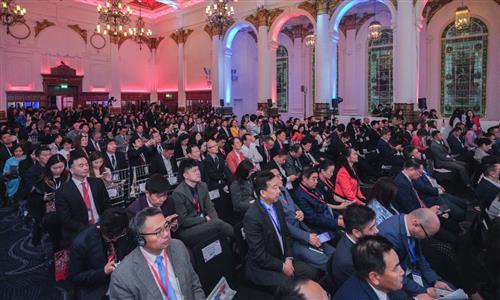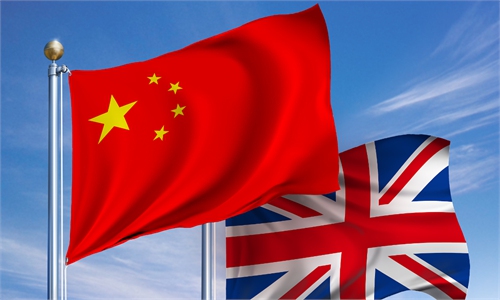UK-China collaboration is not merely an option; it is an imperative: 48 Group Club's Jack Perry Jr

Dragon performers entertain the crowd during the Chinese New Year parade in London on February 11, 2024. Photo: VCG
The UK-China relationship has undoubtedly faced significant challenges in recent years. Diplomatic tensions, evolving global priorities, and domestic political shifts have all contributed to what can be described as a delicate period. However, amidst these challenges, there is a growing recognition that collaboration - particularly through business - presents a path forward.As someone who engages extensively with both UK and Chinese enterprises, I am often asked about the key to fostering stronger cooperation. Chinese businesses frequently seek clarity on where they can and cannot invest in the UK. While the British government does outline certain parameters, these are often not communicated with sufficient transparency or consistency. For Chinese investors, inconsistent communication fosters hesitancy. They seek assurances that their investments are secure and aligned with British policy frameworks. It is crucial that we address this issue head-on. If the UK can provide a clearer and more robust framework for foreign investment, it will encourage greater economic collaboration, particularly in sectors vital for both nations.
The UK remains an exceptional destination for investment. Its innovation ecosystem, world-class universities, and leadership in sectors such as renewable energy, advanced manufacturing, and artificial intelligence are globally recognized. Chinese businesses bring unparalleled expertise, resources, and ambition. Together, we have the opportunity to drive advancements that benefit both nations and the wider world.
One such area of collaboration is the transition to net-zero. Renewable energy offers immense potential for joint ventures, especially in battery storage technology - a critical component of future energy systems. Petroleum companies, in particular, can benefit from UK-China cooperation as they navigate the complexities of transitioning to greener operations. By combining the UK's innovative approaches with China's production capabilities and commitment to high-quality development, we can accelerate the shift toward sustainable energy solutions.

Jack Perry Junior, chairman of the 48 Group Club Photo: Courtesy of Jack Perry Junior
The fields of education and healthcare also represent immense opportunities for partnership. In education, the UK and China could explore combined programs, research exchanges, and innovative models that blend the strengths of both systems. In healthcare, particularly the scientific side of healthcare, collaboration could lead to breakthroughs in biotechnology. Southeastern region in China, for example, is rapidly emerging as a hub for high-tech solutions in biotechnology and healthcare innovation. The UK, with its strong tradition of medical research and cutting-edge technology, is well-positioned to complement these efforts. By working together, we can advance not only healthcare systems but also global well-being.
The rise of artificial intelligence represents another frontier where the UK and China can work together. AI has the potential to both divide and unite, depending on how we approach it. On one hand, different regulatory frameworks and ethical considerations could create friction. On the other, AI offers unparalleled opportunities to enhance connectivity, improve global systems, and solve complex problems across industries. If we focus on aligning our efforts - prioritizing ethics, legal frameworks, and shared growth goals - we can harness AI to strengthen our ties and drive mutual progress.
China's emphasis on high-quality development resonates deeply in this context. By focusing on long-term, sustainable growth, China is setting a global example that aligns with the UK's ambitions for innovation and green development. London Export Corporation played a key role in bringing Western businesses to China, fostering enduring connections. Today, through our subsidiary LEC Industries, we continue to prioritize technology and sustainability as the cornerstones of our work. These values are shared and supported by the 48 Group, which remains committed to building bridges of trust and cooperation.
The road ahead is clear: UK-China collaboration is not merely an option; it is an imperative. Through open dialogue, mutual respect, and a shared commitment to progress, we can overcome challenges and achieve extraordinary outcomes. Whether through renewable energy, AI, biotechnology, or education, the opportunities for partnership are boundless. Let us seize them with ambition, clarity, and a focus on building a future that benefits both nations.
As history has shown, when the UK and China come together, the results can be transformative. It is time for us to write the next chapter.
The author is Chairman of the 48 Group and CEO of London Export Corporation.



